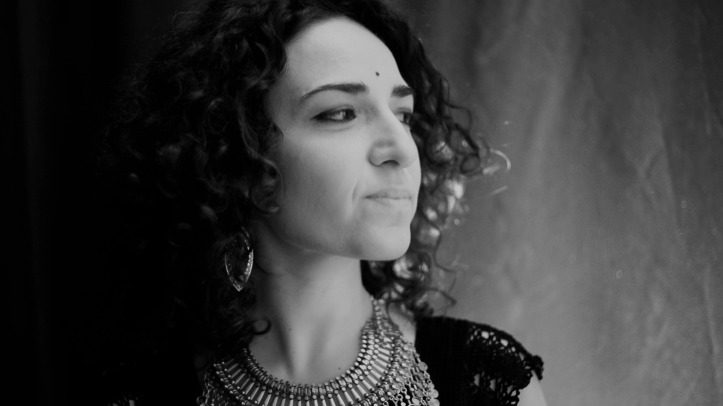April 28, 2023
Radwa Hosny

Carina is multilingual singer-songwriter, music composer and visual artist, Born in Lebanon, she is currently based in Paris. Speaking several languages, she bridges different cultures through her songs that range from oriental, European, Asian, Sufi and Armenian music. Her latest album, “Safrit Rishé” (سَفرِة ريشة), was released in March 2022 with the support of Basita Live, Agora for Arts and Culture and Drosos Foundation as part of the Basita Fellowship. After that she wrote several songs that are yet to be released.
WoE: When did your relationship with art begin?
Carina: My relationship with art started at a very young age. Ever since I can remember, my father played the piano; his joyful and beautiful melodies always filled our home. My mother enrolled me at the music conservatory at the age of 6 to learn the classical piano, I also got to join a dance troupe at the age of 9, and took art lessons for many years.
WoE: How did you come up with your current project?
C: Having been inspired by my father at my young age, I always wished I could compose and improvise music like he did. At 17, I embarked on a spiritual journey practicing yoga and meditation. My first songwriting experiences began a few years later when I started hearing music during my practice sessions. They were very humble, intuitive and were a means of expressing the divine gratitude I was feeling.
Anytime I felt inspired, I wrote songs, and it naturally became a part of my life. After this, I had the longing to sing and compose songs. I chose the guitar to accompany me during my live performances and soon after, I formed a band.
WoE: What is art for you?
C: Art is the life-giving energy to my soul. I can’t imagine my life without music, dance, visual arts, theater, and basically any type of art. Ever since my young age I was taught to appreciate music, ballet, paintings, architecture, theater, poetry. How beautiful are our lives because of these delicate arts! And how ugly would they be without them!
WoE: How can Arab women be liberated from their restrictions through art?
C: Arab women artists need to overcome doubt and fear in order to create an internal safe space for self-expression. This self-expression naturally makes way for a deep and joyful fulfillment, which the world truly needs. By pursuing their passions, Arab women can gift and enrich the world with the products of their talent.
WoE: What difficulties you encountered on this artistic journey, and lessons learned?
C: The most difficult aspect has been dealing with financial instability, remaining perseverant in the face of rejection and coping with mental health. And yet this journey has also been a blessing because it has empowered me. It showed me my strengths, it taught me how to love myself, believe in myself and take care of myself.
I learned that I am strong, resilient and can be very determined. Today, failure and rejection do not affect me as they used to. I try my best to learn from my mistakes and to see every rejection as a redirection towards something better.
WoE: In your opinion, what are the obstacles facing Arab artists in general, and female artists in particular?
C: We as Arabs live in countries where culture is not a primary priority– at least this is the case in Lebanon. If you’re an independent artist who is making non-commercial art, things get automatically difficult for you due to lack of support. Our governments do not capitalize on cultural development as a major investment for us as individuals and for our societies, and thus we, the artists, are the ones who pay the price first. We are driven to find resources elsewhere and are forced to keep our artistic pursuits as hobbies. We also face political and economic unrest; lack of security, daily challenges to survive and have to worry about our future.
Women artists have so much talent and yet receive so little opportunities. We face social pressures, gender inequality, prejudice, we are underrepresented, and we lack support and resource. We are at risk of sexual violence and harassment especially in the cultural sector, which in turn paralyzes our involvement and productivity.
WoE: Was the talent alone enough, or did the study play a greater role in the development of your career as an artist?
C: Talent is never enough to create excellence. It takes a lot of learning and practice to improve. One has to remain a student, always learning, working on him/herself to get better. I hope I never face the day where I say, “I’ve mastered this” because I know that will be my end.
The presence of teachers also played a huge role for me. Here I would like to take the opportunity to thank all my wonderful teachers and mentors who contributed to making me who I am today with their knowledge and graceful guidance.
WoE: What are your next steps in your artistic career?
C: My band and I are getting ready for an upcoming performance in Paris. I am currently working on a few new songs, and preparing for a new release.
WoE: Any advice for Arab artists who are still at the beginning of her journey?
C: Always believe in yourself. If someone says, “you can’t do it” pursue your dream harder. Talent is a divine energy, trust in it and keep going forward.
